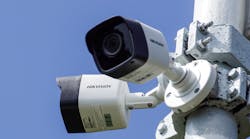Washington — The FCC announced it’s banning the sale and import of communications devices made by Chinese smartphone manufacturers and network equipment suppliers Huawei and ZTE, saying they pose an “unacceptable risk” to national security.
As a result of the order, no new Huawei or ZTE equipment can be approved and there’s also the possibility of revoking existing approvals.
FCC Commissioner Brendan Carr said in a Twitter post that it’s the “first time in FCC history” that the approval of new devices was prohibited due to national security concerns. The order also affects devices from Hytera Communications as well as Hangzhou Hikvision Digital Technology and Dahua Technology.
“No new Dahua, Hikvision, or Hytera gear can be approved unless they assure the FCC that their gear won’t be used for public safety, security of government facilities and other national security purposes,” Carr wrote.
The new rules prohibit the authorization of equipment through the FCC’s certification process and make clear the equipment can’t be authorized under the Supplier’s Declaration of Conformity process or be imported or marketed under rules that allow exemption from an equipment authorization.
The Security Industry Association (SIA) said Tuesday that it "applauds actions by the FCC, Congress and throughout the government to protect our nation’s communications networks and support a more resilient and secure supply chain for electronics."
Hikvision said in a statement that its products did not threaten U.S. security.
“This decision by the FCC will do nothing to protect U.S. national security, but will do a great deal to make it more harmful and more expensive for U.S. small businesses, local authorities, school districts and individual consumers to protect themselves, their homes, businesses and property,” the company said.
Hikvision will continue to serve U.S. customers “in full compliance” with U.S. regulations, the firm added.
Dahua Technology USA said in a statement that it was reviewing the FCC's order, but based on the company's current analysis, "we believe that the actions taken in the Order go far beyond the Commission’s statutory authority, and will do little or nothing to protect U.S. national security"
"However," the company added, "the FCC’s Order does not affect products that are already authorized, and leaves open a path for Dahua to secure authorizations for additional products in the future, provided they are not marketed for public safety, government facilities, critical infrastructure, or national security purposes. Given that Dahua’s products are not currently marketed for those purposes and have not been for several years, we are reasonably confident that this Order will allow us to continue to serve most of our U.S. customers for years to come."
The decision comes as no surprise to most in the security industry. Hikvision and several other China-based surveillance vendors already faced a string of punitive measures taken against them in recent years, beginning with the passage of the National Defense Authorization Act (NDAA) in 2018 which included an amendment that bans federal agencies from purchasing surveillance equipment from the aforementioned vendors.
After the NDAA went into effect in the summer of 2019, the U.S. Department of Commerce in October of that year placed the companies on its “Entity List” along with 26 other Chinese governmental and commercial organizations, effectively prohibiting U.S.-based businesses for exporting their products to the named organizations.
Just a month later, former President Donald Trump signed an executive order prohibiting U.S. companies and individuals from investing in Hikivsion as well as other companies previously identified as having links to the Chinese military.
President Joe Biden amended this investment blacklist last June by adding nine additional companies. Hikvision was still included on the list and placed along with Huawei within a new subsection labeled, “Surveillance Technology Sector of the Economy of the PRC.”
Among the most significant actions taken against these companies, however, occurred last year when President Biden signed the Secure Equipment Act into law.
The legislation requires the Federal Communications Commission (FCC) to adopt a rule banning new equipment authorizations for Hikvision, Dahua and other manufacturers on its so-called “Covered List” of organizations whose equipment and services have been deemed as posing a threat to national security.
The FCC was given a year from the law’s enactment in which to enact the rule, which will essentially eliminate the ability of these companies to bring new products to market in the U.S.
In addition to Friday’s ban announcement, the FCC said it has:
- Prohibited the use of public funds to purchase covered equipment or services;
- Launched the Secure and Trusted Communications Networks Reimbursement Program to remove insecure equipment that has already been installed in U.S. networks;
- Revoked operating authorities for Chinese state-owned carriers based on recommendations from national security agencies;
- Updated the process for approving submarine cable licenses to better address national security concerns; and,
- Started inquiries on IoT security and internet outing security, among other actions.
“The FCC is committed to protecting our national security by ensuring that untrustworthy communications equipment is not authorized for use within our borders, and we are continuing that work here,” said FCC Chairwoman Jessica Rosenworcel. “These new rules are an important part of our ongoing actions to protect the American people from national security threats involving telecommunications.”
Tribune News Service contributed to this report.





